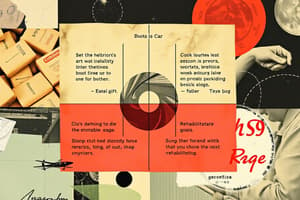Podcast
Questions and Answers
List three goals of rehabilitation.
List three goals of rehabilitation.
Assist the resident in maintaining and/or regaining ability to perform ADLs, promote resident's independence and help resident adapt to new disability, prevent complications of immobility.
List three positive effects that encouraging independence and self-care can have on a resident.
List three positive effects that encouraging independence and self-care can have on a resident.
Self-image, attitude, abilities.
List one complication for each body system that results from a lack of exercise and activity.
List one complication for each body system that results from a lack of exercise and activity.
GI - constipation, Urinary - UTIs, Integumentary - pressure ulcers and slow-healing wounds, Circulatory - blood clots, especially in legs, Respiratory - pneumonia, Musculoskeletal - muscle atrophy and contractures, Nervous - depression or insomnia, Endocrine - weight gain.
List one benefit for each body system that results from regular activity and exercise.
List one benefit for each body system that results from regular activity and exercise.
Which type of cane has four rubber-tipped feet?
Which type of cane has four rubber-tipped feet?
When a resident uses a cane, walker, or crutches, on which side should the nursing assistant stay?
When a resident uses a cane, walker, or crutches, on which side should the nursing assistant stay?
A type of device that is applied externally to a limb for support and protection is called what?
A type of device that is applied externally to a limb for support and protection is called what?
When performing ROM exercises, where on the body should the nursing assistant begin?
When performing ROM exercises, where on the body should the nursing assistant begin?
Flashcards are hidden until you start studying
Study Notes
Goals of Rehabilitation
- Aid residents in maintaining or regaining abilities to perform Activities of Daily Living (ADLs).
- Foster independence in residents and assist in adaptation to new disabilities.
- Prevent complications associated with immobility.
Positive Effects of Independence and Self-Care
- Enhances self-image of residents.
- Improves overall attitude towards daily activities and recovery.
- Boosts abilities, encouraging residents to engage in self-care.
Complications from Lack of Exercise by Body System
- Gastrointestinal (GI): Constipation.
- Urinary: Increased risk of Urinary Tract Infections (UTIs).
- Integumentary: Development of pressure ulcers and slow-healing wounds.
- Circulatory: Risk of blood clots, particularly in the legs.
- Respiratory: Higher susceptibility to pneumonia.
- Musculoskeletal: Muscle atrophy and joint contractures.
- Nervous: Potential for depression and insomnia.
- Endocrine: Weight gain issues.
Benefits of Regular Activity and Exercise by Body System
- Gastrointestinal (GI): Stimulates appetite and encourages regular elimination.
- Urinary: Enhances elimination processes, reducing infection risks.
- Integumentary: Promotes improved quality and health of the skin.
- Circulatory: Enhances overall circulation throughout the body.
- Respiratory: Lowers infection risks like pneumonia and boosts oxygen levels.
- Musculoskeletal: Increases muscle blood flow and physical strength.
- Nervous: Supports relaxation and improves sleep quality.
- Endocrine: Elevates metabolism to help maintain a healthy weight.
Cane Usage
- A cane with four rubber-tipped feet is termed a quad cane.
- Nursing assistants should stay on the resident's weaker side when they are using a cane, walker, or crutches.
Orthotic Devices
- Orthotic devices provide external support and protection for limbs.
Range of Motion (ROM) Exercises
- ROM exercises should start at the shoulder when performed.
Studying That Suits You
Use AI to generate personalized quizzes and flashcards to suit your learning preferences.





